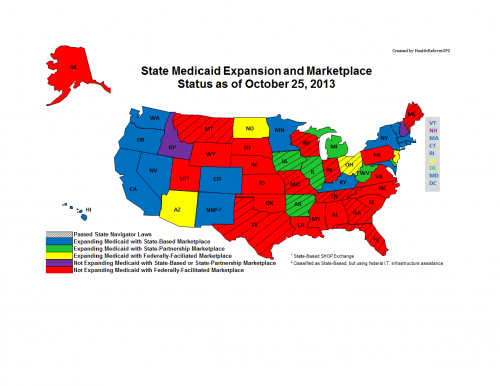New report looks at how states' restrictions on ACA implementation are affecting access

The first study to gauge the impact of state restrictions on the roll-out of the Affordable Care Act (ACA) indicates that community health centers across the country are engaged in an intensive effort to find and enroll eligible and uninsured patients and community residents. At the same time, the findings from the study, by the Geiger Gibson/RCHN Community Health Foundation Research Collaborative at the George Washington University School of Public Health and Health Services, show that health centers working in restrictive states are hampered in their outreach and enrollment efforts and are significantly less optimistic about the impact of health reform in their communities.
"These findings show the effects of state policies that are designed to stand in the way of health reform. These restrictive policies are measurably impairing community-level efforts to cover the uninsured," said Sara Rosenbaum, JD, the Harold and Jane Hirsh Professor of Health Law and Policy at SPHHS and a study co-author. "Without the Medicaid expansion or comprehensive enrollment assistance, millions of people in medically underserved communities could go without the benefits provided under the Affordable Care Act."
The study, "Assessing the Potential Impact of State Policies on Community Health Centers' Outreach and Enrollment Activities," is the first to examine efforts on the front lines to find and enroll uninsured people, many of whom are living in rural and urban communities that face high poverty rates, elevated health risks and a shortage of primary health care. Using data from a nationwide survey, conducted in partnership with the National Association of Community Health Centers, the authors examined the early outreach and enrollment efforts of 606 community health centers across the United States. According to the authors, by early October 2013, virtually all of the responding health centers had received enhanced outreach funding, and three quarters had already instituted expanded outreach and enrollment assistance efforts such as one-on-one assistance with both online and paper applications for health insurance, and enrollment help in multiple languages.
In addition to reporting overall findings from the national survey, the researchers compared health center outreach and enrollment in the 21 states and the District of Columbia that have fully embraced health reform to health centers in nine states (heavily concentrated in the South and Midwest) that have resisted or rejected key parts of the ACA. For the purposes of this study, restrictive states were defined as those that had both rejected an expansion of Medicaid and adopted policies or Navigator laws which make it harder to provide assistance to the uninsured.
While these so-called Navigator laws ostensibly are aimed at only federally-certified Navigators, the report notes that health centers in restrictive states are significantly less likely to provide health plan enrollment assistance. That finding suggests these policies are having a broad chilling effect on the ability of health centers to reach out and provide help to the uninsured and others in the community.
Among the report's top findings:
- Health centers across the country are actively engaged in community outreach through expanded on-site and community assistance and new partnerships, including partnerships with colleges and universities and programs serving young adults in need of coverage. In addition to assistance with both paper and online applications, 60 percent of health centers reported that as of early October, when enrollment assistance was just getting under way, they were helping with documentation efforts as well.
- Community health centers in the restrictive states had significantly more limited outreach and enrollment resources and had significantly fewer enrollment staff (an average of three full-time enrollment staff in restrictive states compared to six in full implementation states.)
- At the time of the survey, health centers in restrictive states were significantly less likely than those in full implementation states (59 percent compared to 79 percent) to be assessing patient eligibility for insurance coverage.
- Health centers in the nine restrictive states were significantly less optimistic about the potential impact of the ACA on their patients. In restrictive states, nearly one in six health center leaders expected at least half of their patients to remain uninsured. In full implementation states, only 2 percent said they believed that half or more of their patients would remain uninsured.
"Health center outreach is essential to turning the promise of health reform into a reality, and this report confirms that state-level-restrictions are making it much harder to sign people up for health coverage." said Feygele Jacobs, president and CEO of the RCHN Community Health Foundation. "Health centers and their communities will need additional support to reach and enroll the nation's most vulnerable residents."

















